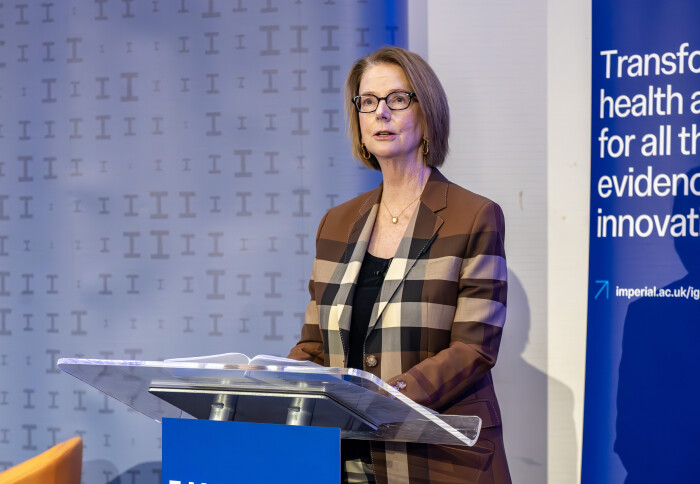Julia Gillard looks ahead with hope to the outlook for science at IGHI Lecture

Ms Julia Gillard AC speaking at the Institute of Global Health Innovation Special Lecture
On 28 November, Imperial’s Institute of Global Health Innovation hosted Julia Gillard AC, Chair of Wellcome and former Prime Minister of Australia.
At the Institute of Global Health Innovation Special Lecture, Ms Gillard shared her insights on the outlook for science and politics in 2025 and beyond.
During the lecture, Ms Gillard discussed the hope offered by science and the importance of global cooperation on critical issues such climate change, infectious disease and antimicrobial resistance, asking: How we can we best meet the opportunities and challenges that lie ahead?
“I think we can find a lot of hope in the power of science. Science that unlocks the potential to change things for the better,” she said.
What this history clearly shows is that science has been international and interdisciplinary for 100 years and more; it’s about collaboration as well as curiosity. ‘Team Science’ all the way. Ms Julia Gillard AC Chair of Wellcome, former Prime Minister of Australia
Ms Gillard introduced the history of the discovery of penicillin – first named as mould broth filtrate, before a rebrand – and its Australian connection, speaking on the need to address the spread of drug-resistant infections that we are facing today. Speaking in the Sir Alexander Fleming building on Imperial College London’s South Kensington campus, the work of the Fleming Initiative on antimicrobial resistance was emphasised for the role it will play as part of the international, collaborative work needed reduce global deaths caused by drug-resistant infections.
Ms Gillard said: What this history clearly shows is that science has been international and interdisciplinary for 100 years and more; it’s about collaboration as well as curiosity. ‘Team Science’ all the way.
Wellcome, a global charitable foundation this year joined by a new Chief Executive John-Arne Røttingen, has a mission to support: science to solve the urgent health challenges facing everyone.
“Science alone doesn’t change the world. Wellcome has a role in providing many different forms of support that help research to have impact. Support means funding, yes, but also convening and challenging, speaking up for and acting to keep your work front and centre in decisions that impact people’s health,” Ms Gillard said.
Highlighting the role of science and society in driving solutions for the future, Ms Gillard added: “We in the research community must engage with wider society – explain what we do, why we do it, and what it’s like to work with uncertainty as well as with knowledge.’’
Ms Gillard highlighted the health impacts of climate change, saying: “In order to bring people together, share the burden, generate a critical mass of actors, and co-create agendas to guide research and action, Wellcome funded a project called Connecting Climate Minds,” an Imperial-led project generating evidence for how the climate crisis affects mental health.
Ms Gillard also spoke about the inspiring change that meets the needs of people and communities living at the sharp end of climate change and of many other health challenges.
During the lively Q&A, attendees asked about a range of issues on the future of global health policies. Global challenges can only be solved with multidisciplinary work, which is at the core of what both Wellcome and IGHI do.

Collaboration
The lecture and discussion illuminated the importance of teamwork; “Team Science", as Ms Gillard said. Speaking to not just the need for areas of convergence science and multidisciplinarity, the audience heard of the team culture that is vital for transformation in global health.
“Inclusion is the best way to excellence. It’s not about one hero man, we need teamwork, respect, diversity and inclusion as much as we need scientific method,” Ms Gillard said.
When welcoming Ms Gillard to Imperial, Professor Lord Ara Darzi, Co-Director of the Institute of Global Health Innovation, mentioned Imperial’s strategy, Science for Humanity, and said: “Our aim is to develop the people and skills the world needs, strengthen research for innovation and amplify the impact of new discoveries, inventions and ideas.” The lecture and discussion that followed described how none of that is possible without collaboration.

Tackling big political issues, including women’s reproductive health, is linked to the crucial need for researchers and scientists to speak out, Ms Gillard explained. “Science needs to be as easy to access and understand as fear-mongering campaigns,” she said, in order to ensure it is a high priority in public discussion.
With audience questions coming from people as young as 13, Ms Gillard called on the younger generation and early career researchers to engage and take action to shape the future of science and politics, and inspire hope.
The lecture was enjoyed by a diverse audience, including researchers, policymakers, members of the public and the Imperial community, with over 200 people attending in person.
For anyone who would like to watch the full lecture, a recording is available on YouTube

Article text (excluding photos or graphics) © Imperial College London.
Photos and graphics subject to third party copyright used with permission or © Imperial College London.
Reporter
Dr Laura-Maria Horga
Institute of Global Health Innovation
Victoria Murphy
Institute of Global Health Innovation